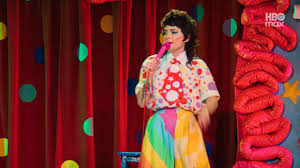Mediterranean Fever 2022 Movie Review
Middle-aged man Waleed (Amer Hlehel) is a glass-half-full kind of guy. He has a bit of Tony Soprano about him. He refuses to take the medication that his psychiatrist wants to prescribe for his chronic depression. He argues with his wife, a nurse, over how they should look after their two children. He feels that he’s carrying the weight of the world on his shoulders. He’s a writer with a novel that’s not making it onto the page. With Mediterranean Fever [+], debuting in Un Certain Regard at the Cannes Film Festival, director Maha Haj has created a black comedy full of surprises.
The director cut her teeth working as a production designer on The Time That Remains by Elia Suleiman, The Attack by Ziad Doueiri and On the Hill by Raphaël Nadjari. She made the documentary Behind These Walls in 2010, and her fictional directorial debut, Personal Affairs, a twisted tale about Palestinians living in Israel on the West Bank, was selected for Un Certain Regard in 2016. Her work finds humour in contradictions.
In a pre-credits scene, Waleed claims to have pushed a guy’s mother down a flight of stairs, only for the son to ask him how he knows that his action was really the cause of his mother’s death. It’s a bizarre, unexpected and fascinating reaction, and it leaves 40-year-old Waleed completely bewildered. It’s an intriguing way for the film to start, as this scene has little to do with the rest of the plot but raises questions that become central as the film progresses. Is Waleed an unreliable narrator, or could he be something more sinister? Are these events random or planned?
The title references an illness that a doctor says that his son, the youngest of his children, may have. When told this, Waleed asks what Mediterranean Fever is. The reply is that it’s something that’s inherited and which is particular to the region where they live. It’s a response so open that it could apply to the Middle East itself. The Mediterranean Fever that the film is concerned about isn’t the son’s physical ailment, but rather the political, social and psychological burden of being a Palestinian in Haifa. The movie cleverly deflects this Palestinian tale away from being about religion by having Waleed refusing to complete a diversity form because he argues his faith is Palestinian, and that’s not allowed as an answer. The computer will not let him continue.
Waleed’s life changes when he befriends a new neighbour, Jalal (Ashraf Farah), a small-time crook living in his apartment building. They are like chalk and cheese. Their differences are played up in their first real exchange on the street, where they seem to disagree about everything. But then, slowly, an unlikely buddy-buddy story develops as Waleed asks Jalal to show him the life of a criminal for a novel he claims to be writing. As the friendship develops, Jalal realises that Waleed’s story keeps on changing, and while Jalal might be a crook, he’s an honest friend. Will Jalal’s forthrightness and friendship be Waleed’s saviour?
Keeping us guessing right up to the end, Haj’s anecdotal comedy about depression is a refreshing look at the region’s political turmoil with a lovely friendship at its heart.
Mediterranean Fever is a Palestinian-German-French-Cypriot-Qatari co-production, staged by Pallas Film GmbH, Still Moving, AMP Filmworks, Majdal Films and Metafora Production. Luxbox is in charge of its international sales.




